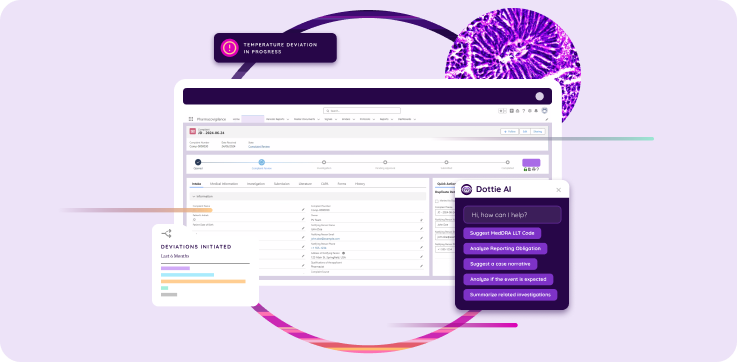QMS for Life Sciences: Buyer’s Guide for 2025

An effective quality management system (QMS) is key for life sciences organizations. From clinical-stage biotech startups to global pharmaceutical manufacturers, the right QMS supports regulatory compliance, ensures product quality, and streamlines operations. Choosing the right system in 2025 impacts compliance, efficiency, and risk.
This buyer’s guide outlines what to look for, what questions to ask, and how to evaluate vendors when selecting a QMS for your life sciences organization.
Why the QMS Decision Matters in 2025
The life sciences industry faces growing complexity. Regulations are evolving, supply chains are global, and expectations for speed and traceability continue to rise. A modern QMS must do more than document control—it must enable collaboration, support risk mitigation, and ensure continuous compliance across departments and geographies.
Key drivers for investing in a new QMS in 2025 include:
- Transitioning from paper or legacy systems
- Preparing for regulatory inspections
- Scaling operations or entering new markets
- Enabling AI, automation, or digital transformation initiatives
Core Requirements for a Life Sciences QMS
Before comparing vendors, define your business and regulatory needs. At a minimum, a QMS for life sciences should include:
- Document Management (SOPs, forms, policies)
- Training Management (assignments, records, exams)
- Corrective and Preventive Action (CAPA)
- Deviation and Nonconformance Management
- Change Control
- Audit Management
- Risk Management
- Supplier Quality Management
- Complaint Handling
- Validation support
- 21 CFR Part 11 and Annex 11 compliance
- Electronic signatures and audit trails
Ensure the system supports GxP compliance and aligns with global standards such as:
- FDA 21 CFR Part 11
- EU GMP Annex 11
- ISO 13485 (for medical devices)
- ICH Q10 (for pharmaceutical quality systems)
Deployment Options: Cloud vs. On-Premises
Cloud-based QMS is now the preferred option for most life sciences organizations. It offers:
- Faster implementation
- Lower upfront costs
- Automatic updates and patches
- Better scalability
On-premises QMS solutions require more resources for maintenance, validation, and upgrades. In 2025, cloud solutions are more widely accepted, even by the most regulated firms.
Evaluation Criteria: What to Look for in a Vendor
1. Industry Specialization
Choose a vendor with proven experience in life sciences. Generic solutions may lack features needed to meet GxP and regulatory expectations.
2. Speed of Deployment
Look for vendors that offer out-of-the-box configurations and pre-validated templates to shorten go-live timelines.
3. Validation Support
Ensure the vendor provides IQ/OQ/PQ templates or full validation packages to support initial and ongoing validation requirements.
4. Configurability Without Coding
The system should let your team update workflows, forms, and fields without custom development.
5. Integration Capabilities
Ensure the QMS integrates with ERP, LIMS, MES, and other systems in your tech stack. Ask for examples.
6. Security and Compliance Certifications
Check for ISO 27001 and other relevant certifications. Verify that the system enforces role-based access, data encryption, and audit logging.
7. AI and Automation
Evaluate how the system leverages AI to automate document review, identify quality trends, flag risks, or support inspection readiness.
8. Support and Training
Assess the vendor’s onboarding, training, and customer support. Check whether they offer a dedicated customer success manager.
Key Questions to Ask
- What GxP processes are available out of the box?
- How long does implementation typically take?
- What does the validation process include?
- How is the system updated and maintained?
- Does the system support multi-site, global operations?
- What are the total costs—license, implementation, training, support?
- Can you share customer references from life sciences?
The Bottom Line
In 2025, the right QMS helps life sciences companies meet growing regulatory demands, improve quality outcomes, and stay competitive. Prioritize systems built for your industry, with strong validation support, scalability, and a modern user experience.
Choosing a QMS is a long-term decision. Use this guide to ensure you’re asking the right questions and investing in a system that will support your growth, innovation, and compliance goals.
Get more insights into choosing the best solution for your life sciences organization. Download our white paper and learn how to choose the right eQMS.



